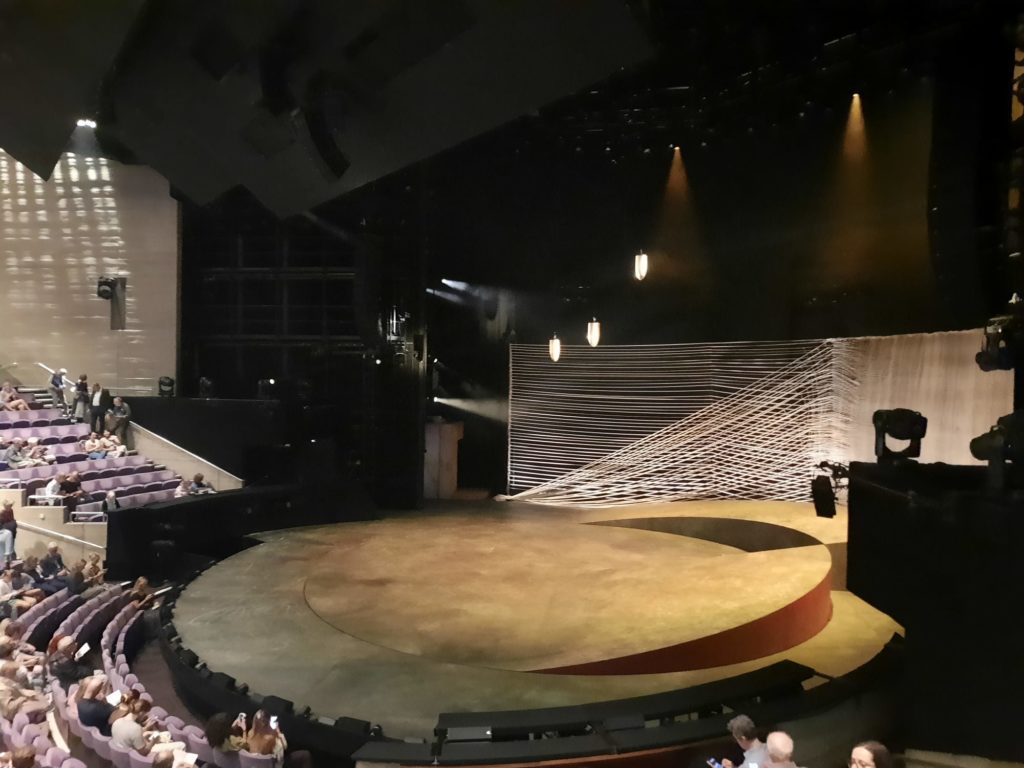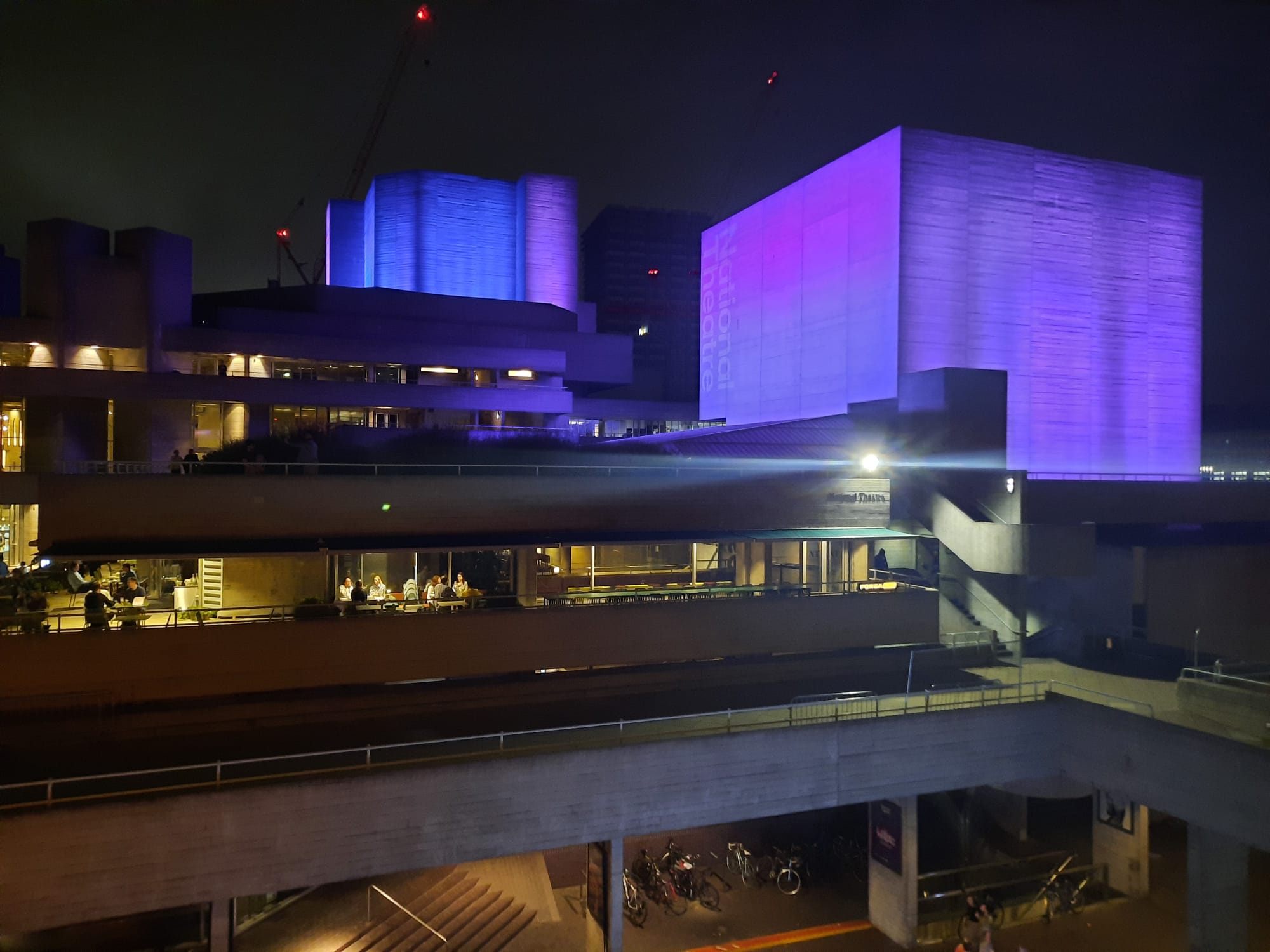The Father And The Assassin – National Theatre, London
The Father and the Assassin features an unexpectedly charming murderer, a wonderfully evocative set and score, and a talented cast.

The Father And The Assassin
I didn’t think a play about the man who murdered Gandhi would be so funny. And yet Anupama Chandrasekhar’s play The Father and the Assassin, now in its second run at the National Theatre, is just that. Its central character, Nathuram Godse, is a witty, charming, murderous and violent unreliable narrator. And Hiran Abeysekera, now in the lead role, grips the audience from the start.
The life of Nathuram Godse, or what we know of it, has provided Chandrasekhar an intriguing jumping off point. Born in 1910, his parents, who had lost three infant sons while their daughter survived, believed their male line was cursed and raised their fourth son as a girl. As a child, he was believed to be an oracle for the goddess Durga. By some seemingly fated coincidence, as a young man Godse ended up living in the same small city as Hindu activist Vinayak Savarkar (played by Tony Jayawardena) , on conditional release from the Andaman Islands’ infamous Cellular Jail.
It’s one of those stories where truth seems almost stranger than fiction. And yet these are the circumstances of the life of Nathuram Godse, who on 30 January 1948 shot and killed Mohandas Gandhi (here played by Paul Bazely) in protest at his promotion of peace between Hindus and Muslims. The Father and the Assassin traces these events, from Godse’s childhood to his imprisonment, trial and execution in November 1949.
An Unreliable Narrator
The format of the play, with Godse as unreliable narrator, is what makes it so intriguing, and also provokes real thought. As well as telling the little known (at least in the UK) story of Gandhi’s killer, The Father and the Assassin takes a look at what makes people kill for ideology, and how relatively simple it is to justify increasingly extreme points of view to oneself. This latter point has very obvious resonances today.
But early on, we learn that Godse may not be telling us the truth, the whole truth, and nothing but the truth. The little voice of doubt pipes up in the form of childhood friend Vimala (Aysha Kala). Much to Godse’s chagrin, she interrupts several times to set the story straight. It’s very clever. Humans are endlessly fallible creatures, and one of the many ways in which we are fallible is our ability to misremember and bend facts and memories to suit our narrative. Godse is an example of justifying a shocking act on political grounds. But Chandrasekhar sets out how relatively easy this path can be to tread once you’re on it. And the rapport with Godse puts the audience in the uncomfortable position of being at best confidantes, at worst co-conspirators.
The Father and the Assassin is written with a National Theatre audience in mind (Chandrasekhar was a writer in residence here). All the necessary bits of history are explained, and there are plenty of jokes aimed at a British audience. And yet it does not shy away at all from the truth of British Imperialism in India. Again this can be uncomfortable, but I welcomed this straightforward perspective. There is a section towards the end to explain the 1947 Partition of India and Pakistan which feels a little more rushed both in its narration and its perspective on the British role in events. But with a 2.5 hour run time already this would need to be the subject of another evening’s theatre.
Master Craftsmen
Having missed The Father and the Assassin in its initial run last year, I was pleased to have the opportunity to see it now. In many respects it is a master class, both in terms of some of the acting, and the other creative roles.
I have already mentioned Hiran Abeysekera as Nathuram Godse. This is a very demanding role physically in terms of the time on stage and energy required. And also demands keeping the audience in the palm of one’s hand the the spell of one’s tory. Abeysekera is superb, and I only regret never seeing him in The Life of Pi. The rest of the 19-strong ensemble cast wraps around this central role to create an evocative experience. They create a sense of the excitement and energy of the independence movement: the Salt March scenes are particularly noteworthy. Nadeem Islam in a small role as Mithun is memorable and touching, a catalyst to Godse’s position hardening.
Rajha Shakiry’s set is simple yet very effective. It’s a good use of the Olivier Theatre’s revolving stage, and the backdrop of unfinished homespun cloth says so much with so little. Siddhartha Khosla’s score is likewise a subtle and ever-present thread, setting the scene and tying the creative vision together.
I wonder what the reason for this second National Theatre run is. Perhaps a prelude to a transfer somewhere else? Whatever the logic, for those, like me, who missed it initially, I urge you to see The Father and the Assassin. Its humour and beauty do not lessen its relevance and urgency given both the contemporary political situation in India and the proliferation of extremisms of all kinds.
Salterton Arts Review’s rating: 4/5
The Father and the Assassin on until 14 October 2023
If you see this after your page is loaded completely, leafletJS files are missing.

